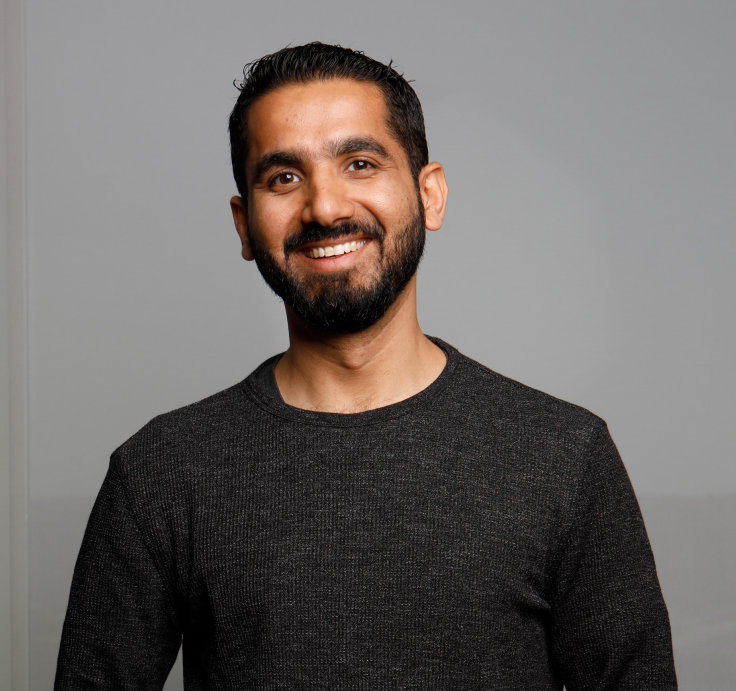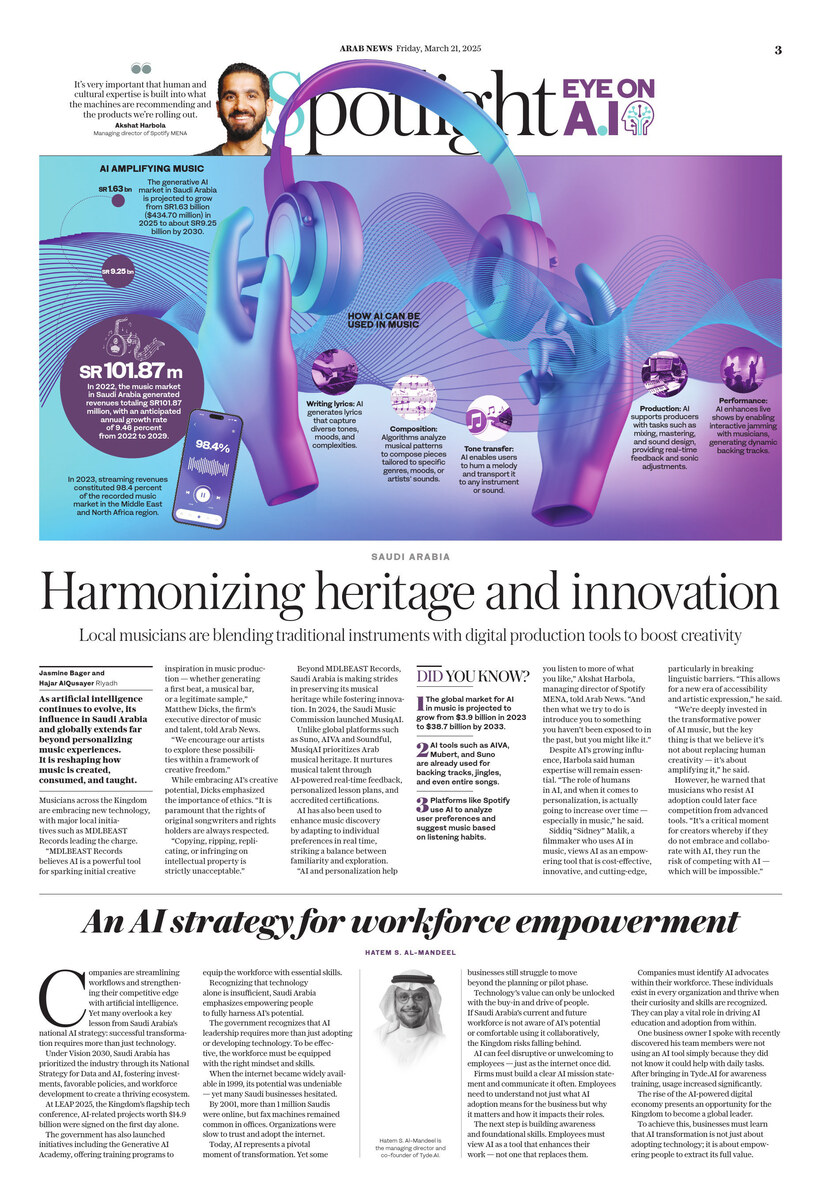RIYADH: As artificial intelligence continues to evolve, its influence in Saudi Arabia and globally extends far beyond personalizing music experiences. It is reshaping how music is created, consumed, and taught, revolutionizing the industry.
Musicians across the Kingdom are embracing new technology, with major local initiatives such as MDLBEAST Records leading the charge.
“MDLBEAST Records believes AI is a powerful tool for sparking initial creative inspiration in music production — whether generating a first beat, a musical bar, or a legitimate sample,” Matthew Dicks, executive director of music and talent at MDLBEAST Records, told Arab News.

“We encourage our artists to explore these possibilities within a framework of creative freedom.”
Launched in 2020, MDLBEAST Records is a Saudi Arabia label that promotes and develops talent from the Middle East and North Africa region.
Part of MDLBEAST entertainment, its roster includes local stars Cosmicat and Dish Dash, among others, along with international names including Salvatore Ganacci.

Matthew Dicks, executive director of music and talent at MDLBEAST Records. (MDLBeast photo)
While embracing AI’s creative potential, he emphasized the importance of ethics. “We also recognize the ethical complexities surrounding AI in music,” said Dicks. “It is paramount that the rights of original songwriters and rights holders are always respected.
“Copying, ripping, replicating, or infringing on intellectual property is strictly unacceptable. We are committed to navigating the evolving landscape of AI in music responsibly, ensuring its use enhances human creativity while upholding the integrity of artistic ownership.”
Beyond MDLBEAST Records, Saudi Arabia is making strides in preserving its musical heritage while fostering innovation. In late 2024, the Saudi Music Commission launched MusiqAI, an initiative integrating AI-driven interactive learning to teach both Arab and Western instruments.

Unlike global platforms such as Suno, AIVA and Soundful, MusiqAI prioritizes Saudi sounds and Arab musical heritage, offering lessons on traditional instruments including the oud and qanun alongside the piano and guitar.
In line with Vision 2030, the platform nurtures musical talent through AI-powered real-time feedback, personalized lesson plans, and accredited certifications.
By blending cultural preservation with advanced technology, it aims to set a new standard for digital music education both regionally and globally.
DID YOU KNOW?
• The global market for AI in music is projected to grow from $3.9 billion in 2023 to $38.7 billion by 2033.
• AI tools such as AIVA, Mubert, and Suno are already used for backing tracks, jingles, and even entire songs.
• Platforms like Spotify use AI to analyze user preferences and suggest music based on listening habits.
AI has also been used to enhance music discovery by adapting to individual preferences in real time, striking a balance between familiarity and exploration.
“AI and personalization help you listen to more of what you like,” Akshat Harbola, managing director of Spotify MENA, told Arab News. “And then what we try to do is introduce you to something you haven’t been exposed to in the past, but you might like it.”
As generative AI advances, the cost of developing innovative listening experiences is falling — a shift that Harbola believes is transformative for the industry.

Akshat Harbola, managing director of Spotify MENA. (Supplied)
“If we were to try to do something like this maybe five years back, it would be impossible because the cost would be so high,” he said. “You would have had to hire transcribers, producers, and you just wouldn’t be able to do it.
“But now we are able to deliver these personalized sessions to millions of users.”
Despite AI’s growing influence, Harbola said human expertise will remain essential. “The role of humans in AI, and when it comes to personalization, is actually going to increase over time — especially in music,” he said.
He also highlighted the importance of cultural nuances in AI-driven recommendations, noting that even shared musical tastes can differ by location.

Aas AI continues to reshape the music industry, ethical concerns surrounding copyright and artistic integrity remain a significant topic of debate among musicians and creators. (Supplied)
“Even if you have the same music taste, what makes sense for somebody in Jeddah may not make sense for somebody in Sao Paulo,” he said. “So it’s very important that human and cultural expertise is built into what the machines are recommending and the products we’re rolling out.”
Nevertheless, as AI continues to reshape the music industry, ethical concerns surrounding copyright and artistic integrity remain a significant topic of debate among musicians and creators.
Addressing these concerns, Harbola emphasized the platform’s strict stance on copyright compliance. “We are very clear that any content that infringes copyright cannot be on Spotify,” he said.
Siddiq “Sidney” Malik, a filmmaker and user of AI in music, echoed this sentiment. “We’re at the intersection of creativity and technology,” he told Arab News. “We’re sort of working to adapt the future of entertainment while we’re actively shaping it.”
Malik views AI as an empowering tool that is cost-effective, innovative, and cutting-edge, particularly in breaking linguistic barriers. “This allows for a new era of accessibility and artistic expression,” he said. “It’s more than just a basic tool.”
Malik said it is not just about typing a prompt into a platform like ChatGPT — it is about creating an entire ecosystem.
“We’re deeply invested in the transformative power of AI music, but the key thing is that we believe it’s not about replacing human creativity — it’s about amplifying it,” he said.
However, he warned that musicians who resist AI adoption could later face competition from advanced tools. “It’s a critical moment for creators whereby if they do not embrace and collaborate with AI, they run the risk of competing with AI — which will be impossible.”
Drawing parallels to shifts in the film industry, Malik noted how creatives have adapted before and must do so again to embrace AI’s possibilities.
“I think we have had these shifts — analog to digital to virtual and now artificial,” he said. “AI gives artists the power to be the masters of their own destiny, which is very important in the music industry.”

Despite AI’s growing influence, human expertise will remain essential, says Akshat Harbola, managing director of Spotify MENA. (Supplied)
Riyadh-based musician Lun encapsulates the cautious yet curious approach many artists are taking toward the rapidly evolving music landscape shaped by AI.
“I have not used AI before in my own music because I never thought I needed to. But as a tool, it can be of help,” he told Arab News.
While intrigued by AI’s potential, Lun highlighted ethical concerns that remain central to discussions across the industry.
“If an artist uses it to help with something they’re stuck on — to compile ideas so they can come up with an original part on their own — then I don’t see any harm in it,” he said.
“But if they use the tool to write the entire thing from A to Z, then I think we have a problem because it is no longer the artist who composed it, regardless of how they spin it.”































